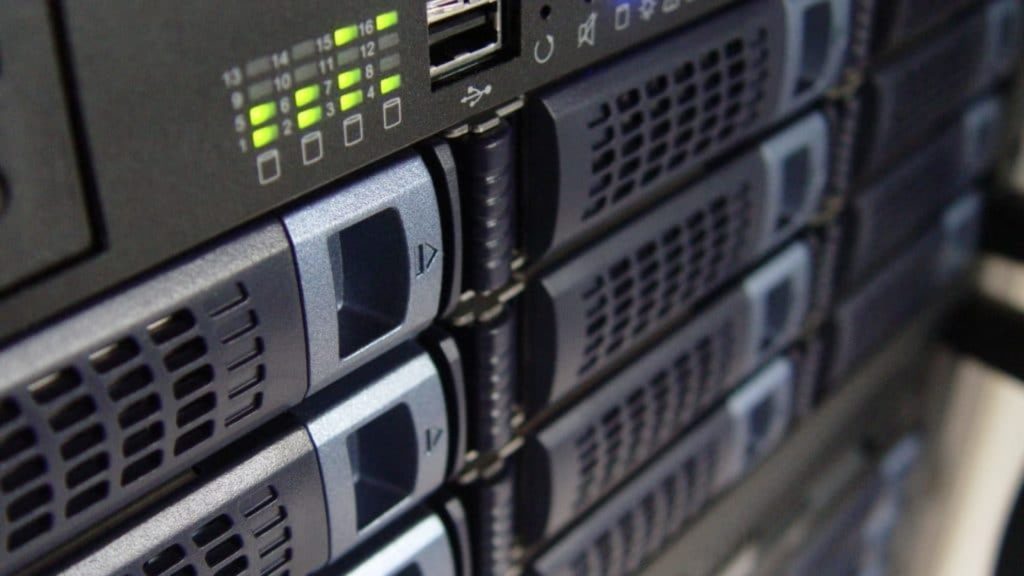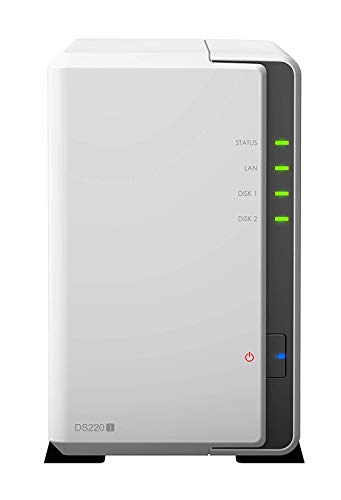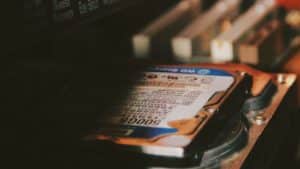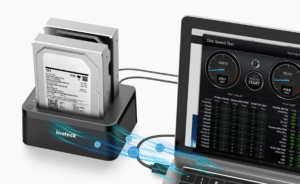When you look under NAS server If you can't imagine anything, then in this article you will learn what exactly makes a NAS server, what you can actually do with it and how a NAS server can also make life much easier in the private sector.
Understand the basic principle

In principle, the NAS server does not differ much from a conventional computer, with one or more hard disk(n). A computer is basically always via a wired connection with a Router connected in the network.
From this point it delivers all the data it needs to all the devices connected to it and receives data from precisely these devices such as computers, Smartphones, laptops, etc. For this reason, the NAS server also has different names such as network drive or network-bound storage and many other terms.
The core functions of a NAS server are, unlike a dedicated server which is connected to the Internet, mostly used in the private sector as a local data distributor. Thus, it usually serves as a central storage medium in the household, from where various devices (such as computers, smartphones, etc.) can be supplied with data.
This primarily serves to save storage space and simplifies the handling of large amounts of data. Imagine that you have a large music collection of 50 GB. Because people want to be able to listen to their music anytime and anywhere, we naturally save it on the computer, on the laptop or on the Smartphone.
The complete collection therefore effectively occupies 150 GB of storage space. However, if you were to use a NAS server and simply stream the music to the device that is currently in use, you would still have access to the entire collection, but you would only need the 50 GB of storage space mentioned at the beginning.
The NAS server thus also helps to save storage space, whereby it is, so to speak, an archive for larger amounts of data. The type of data stored on the server is up to you. Just like on a hard drive in a computer, anything you want can be stored on it.
It should be noted that not all data is suitable for streaming, but a download directly from the server is always possible. The operation itself never happens directly on the device, the NAS server is managed by a device (such as a laptop) connected via the network in a browser. On the one hand, this is very convenient and at the same time ensures that the NAS server can be operated independently of the operating system used.
Is there, so to speak, the “right” NAS server?
There is not just one popular model among servers. The different models differ in terms of performance, the various components inside and also the hard drive slots. There are special NAS servers that specialize in converting media data.
- CPU Realtek 1,4GHz
- 1GB DDR4 memory
- 2 x USB 3.2 Gen 1
- All data in one place with the NAS Storage. Store, access and...
- The central network storage offers simple and efficient...
- The powerful Marvell ARMADA 385 1,3 GHz dual-core processor of the...
- Share your household file server for storage and ...
- The award-winning DiskStation Manager (DSM) offers an intuitive ...
- Accessing and sharing data with Windows MacOS and ...
- Instantly remotely access the NAS326 with the Zyxel Drive app
- Easy-to-use, mobile, co-sharing with the group from the...
- Easy-to-use, mobile, co-sharing with the group from the...
- The ultimate home network storage solution: The F2-212 NAS storage...
- Powerful hardware: The F2-212 Network Attached Storage has...
- Cross-platform file services: The F2-212 file server...
- 4 GB onboard (not expandable)
- 1x 1Gbit LAN; 1x 2,5Gbit LAN; x 25Gbit LAN; 1x USB 3.0
- 1 x 2,5 Gigabit Ethernet port | 1 x Gigabit Ethernet port
- Powerful hardware: The F2-223 NAS storage is equipped with N4505 ...
- Maximum raw internal capacity: 40TB (20TB drive x 2). This...
- Multiple Backup Solutions: Uses Centralized Backup, Duple Backup,...
- [Storage Expansion] The kit includes 4 NVMe M.2 slots that allow...
- [Well established software support] CM3588 offers the OpenMediaVault...
- [High-performance processor] Equipped with Rockchip's powerful RK3588...
- 【Your personal cloud storage with 4 TB large capacity】:...
- 【Two working modes with LED display】: Two working modes meet ...
- 【Centralize all your data】: Support IOS, ...
- 【APP connection for family NAS】: Both mobile devices and ...
- 【VPN exclusive channel with SDVN encrypted tunnel】: The...
- 【Permanent Free Local Private Cloud】: Share photos and ...
These CPUs can, for example, convert 4K video material into 1080p video so that it can be viewed on conventional HD televisions. There are also devices that are not so suitable for such a task, but these can handle data operations particularly quickly with SSD hard drives or impress with the speed of data encryption.
It is important to define exactly what the NAS server is to be used for before you buy it. The number of hard drive slots can also vary greatly. There are already models for end customers with only one slot. With a NAS server for companies, on the other hand, you can accommodate many "bays" and thus also hard drives. This is not necessary for private use, so these are completely oversized for private use. If you want to buy a NAS server for private use, you should look around for devices with one to four slots.
Therefore, there are also differences in the interfaces that need to be considered. There are devices with several gigabyte LAN connections and also systems with an additional HDMI port, which enables a direct connection to the television or to the server with an SD card reader. The options for equipment variants leave nothing to be desired. Purchasing a NAS server for private use usually provides the following scheme.
The server is simply connected to a router via cable. Certain devices are therefore connected to the router. For example, if the purpose is to stream 1080p movies to a TV, it would be recommended that the connection is via a cable. The reason for this is that WLAN is usually not sufficient for the amount of data or leads to unwanted interruptions. Everything else that does not necessarily require a cable connection can also communicate with the NAS server via WLAN.
Basically, the WLAN bandwidth is sufficient to send documents back and forth, stream music, watch videos in low quality, send small amounts of pictures or simply back up personal data. If you have a good signal quality and are using a modern router, you can also try to carry out more demanding tasks (such as 1080p streaming) via WLAN. As a rule, the server is in operation 24 hours a day or when you want to access it with another device. If the Internet connection has the necessary upload bandwidth, data of any kind can theoretically be accessed or streamed over long distances from your own home.
Where are NAS servers used and what else are they used for
As mentioned before, these servers are versatile. If you talk to other owners about it, you will find that such a system was usually purchased for a very specific reason. The longer you use the system, the more tasks you will mostly run on it. From time to time more and more new functions will be discovered that were previously used in a more cumbersome way. You have to learn more about the versatile features of a NAS server.
The servers can also be used as a backup medium and a NAS server can be perfect for backups use. With models that have four hard drive slots, a capacity of up to 40 TB is available. There are also programs for current operating systems that can be used to automate backups. A NAS server is therefore suitable as an archive for data such as photos, but also for documents of material value. For small companies, servers from the entry-level segment are often sufficient to secure their data and make it available to other colleagues.
The NAS server can also be used as a media archive and music, films, pictures etc. can be distributed. This works on classic, computer-like, as well as DLNA-enabled devices (such as televisions. Images can be streamed to all connected devices in your own network. If necessary, the server also converts the content into a suitable format, which then If you save a Blu-Ray film as an MKV file and want to watch it on the iPad, which unfortunately understands MP4 as the file format, the server takes care of the automatic transcoding without any loss of time.
A server of this type also proves to be particularly practical in households in which, for example, a certain series is to be available to all family members at the same time so that everyone can access it at the same time. The server can even be deployed or used as your own cloud. The server is most likely connected to its own router that is connected to the Internet.
That's why you can easily access the device and its content when you're on the go. The NAS server can then be transformed into its own cloud through programs and the advantage is that you don't have to be tied to the often lacking security of services such as Google Drive, OneDrive & Co. As an example, this can be on vacation.
Photos are taken and, as often happens, the memory on the SD card or on the mobile phone is suddenly full. Luckily, you have a NAS server and can easily load the images directly onto the server from anywhere. The servers can also be used in the professional sector. Users who already have a little more experience in this area buy NAS servers with their own mail server or can also access the server's internal network securely from outside via VPN connections. You can also access data via secure FTP access or the more convenient WebDAV standard. A NAS server can also provide reliable services in the case of building security.
You can connect it to a surveillance camera and install the necessary software on the device to get effective surveillance. Only a few applications of a NAS server were listed. Listing all functions would go beyond the scope of this article. So it is safe to say that the device can be used for many more tasks.
What about consumption and expandability
From a number of two hard disk slots, the server is designed for scalability. Today's devices support the so-called RAID standards. If two hard drives are linked together and if you increase data security through automatic mirroring of RAID 1, or if you prefer to increase the speed of the data carrier through RAID 0 - the choice is entirely up to the user. Of course, all hard drives can also be used independently and without a RAID array.
However, the power consumption should not be underestimated. If you want to have the NAS server permanently in operation and use, then you should look around for energy-saving models, because that is completely sufficient for home use. And you should also look around for the right hard drives that are designed for continuous operation and also consume little power. You can also consider building your own, because it is not absolutely necessary to buy a server from one of the big manufacturers like Synology or other big names in this segment. If you take your time and tinker a bit, every user can build their own server from simple components and free operating systems.
Of course, this is more work than buying one, but it is a cheap solution. For beginners in this area, however, it is advisable to buy a ready-made NAS server, pay attention to the power consumption and be clear about the actual use of the server.




![Zyxel Private Cloud Storage / Storage [4-Bay NAS] with Remote Access and Media Streaming (JBOD, RAID1, RAID5) [NAS542]](https://m.media-amazon.com/images/I/41R8gDIYVlL.jpg)












